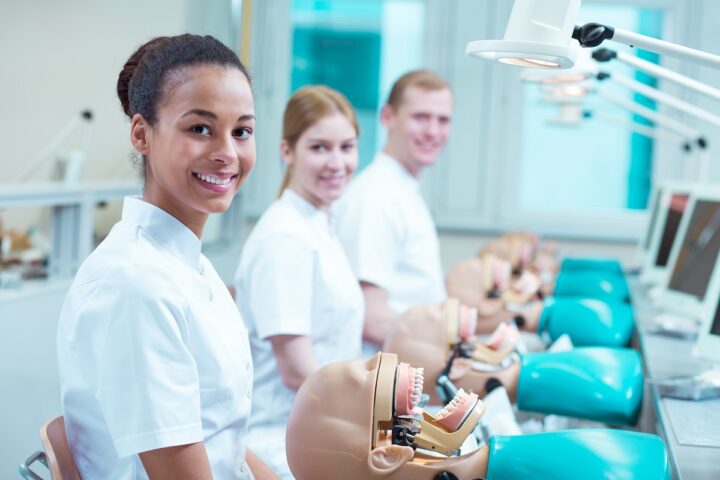Dentistry is an incredibly fulfilling career that offers the opportunity to make a real difference in people’s lives.
As a dentist, you help people maintain their oral health, relieve pain, and improve their overall well-being. But the profession goes beyond just fixing teeth. It’s also about helping people regain their confidence and live better lives, one smile at a time.
But with so many steps involved in becoming a dentist, it can be overwhelming to know where to begin, much less which schools to get into.
Fortunately, this article will explore six essential steps you need to take to start your dentistry career.
1. Complete An Undergraduate Degree

Completing an undergraduate degree is the first step to pursuing a career in dentistry. While some dental schools may accept students who have completed only two years of undergraduate studies, most require a four-year degree.
An undergraduate degree makes you a more competitive candidate. Also, it gives you a strong foundation in the sciences, which is crucial for success in dental school.
When choosing an undergraduate degree program, it’s essential to consider the requirements. While most dental schools don’t require a specific major, they have prerequisite courses that students must complete. These typically include biology, chemistry, physics, and math.
To ensure that you meet these requirements, consider majoring in a science-related field or taking courses that align with dental school prerequisites.
This Medicalaid guide on Dental schools provides information on the best dental schools you can get into and their typical requirements.
Maintaining high grades throughout your undergraduate studies is also crucial to qualify for dental school. Dental schools consider applicants’ GPAs when making admission decisions, so aim for a GPA of 3.5 or higher.
However, balancing academic excellence with other activities, such as volunteering, shadowing, or research, can go a long way in making yourself a well-rounded applicant.
2. Take A Dental Admission Test
The Dental Admission Test (DAT) is a standardized exam that measures your academic abilities and scientific knowledge. It’s a crucial step in the dental school application process and is required by all dental schools in the United States and Canada.
The DAT consists of four sections: natural sciences, perceptual ability, reading comprehension, and quantitative reasoning.
Preparing adequately for the DAT is crucial for success. It’d help to spend at least three months studying and practicing for it. You can find study materials and practice exams online or through test prep providers.
Also, it’s essential to familiarize yourself with the format of the exam and the types of questions you might find.
3. Complete Dental School

Dental school is a rigorous program that typically lasts four years, and it’s designed to prepare you for a career in various settings in the field.
In dental school, you’ll learn about various dental procedures and techniques and how to diagnose and treat dental conditions.
During your first two years, you’ll take courses that cover the basics of dental science, including anatomy, biochemistry, and physiology. Also, you’ll learn about dental materials, pharmacology, and microbiology.
In your third and fourth years, you’ll begin to work with patients in clinical settings. You’ll learn about various dental procedures, including fillings, extractions, and root canals, and how to apply them correctly.
In addition to coursework, dental schools offer various training programs that prepare students for their future careers. These may include externships, which provide hands-on experience working with patients in dental clinics, and research opportunities allowing students to conduct dental research alongside faculty members.
4. Complete A Residency
Completing a residency program is the next crucial step.
A residency program is designed to provide additional training and experience in a specific area of dentistry. It’s an opportunity to gain hands-on experience, build relationships with mentors and colleagues, and refine your knowledge and skills.
Residency programs are available in several areas of dentistry, including general dentistry, orthodontics, pediatric dentistry, and oral and maxillofacial surgery. Each program is designed to provide a unique experience and prepare dentists for specialized practice areas.
A residency program provides an opportunity to work with experienced mentors and colleagues. That can help build relationships and connections within the dental community and provide valuable networking opportunities.
When choosing a residency program, it’s important to consider your career goals and interests. Research the different types of programs available and look for ones that align with your aspirations. Also, consider the program’s location, duration, and specific focus.
5. Obtain Your Dental License

A dental license is a legal requirement that allows you to practice dentistry and offer dental services to patients. You can practice in most states with one.
Obtaining a dental license requires meeting certain requirements, including passing the National Board Dental Examination (NBDE) and the clinical examination administered by your state board.
The NBDE tests your knowledge and understanding of dental sciences. Meanwhile, the clinical examination assesses your practical skills and ability to diagnose and treat dental problems.
In addition to passing these exams, most states require you to meet other requirements, such as completing continuing education courses, submitting an application, and paying a fee.
6. Consider A Specialty (Optional)
After obtaining your dental license, consider specializing in a specific area of dentistry.
Specializing allows you to focus on a particular area of interest and gain advanced knowledge and skills. Also, it provides opportunities for career growth, higher earnings, and job satisfaction.
There are many different specialties in dentistry, such as orthodontics, periodontics, endodontics, pediatric dentistry, oral and maxillofacial surgery, prosthodontics, and dental public health. Each one requires additional education and training beyond dental school.
To make it easy for you to choose a specialty, start considering the areas of dentistry that interest you the most. For example, you may be passionate about helping children or prefer to work with older adults who need complex dental procedures.
Also, you can consider your work style. Suppose you enjoy working with your hands and have a steady hand. In that case, you may enjoy orthodontics or oral surgery.
Ready To Start The Journey?
Dentistry requires a significant investment of time, money, and effort. However, the rewards of this profession are immeasurable, and the impact you can have on the lives of your patients is priceless. Hopefully, the above steps will help you know where to start to pursue a dentistry career.
The field of dentistry is constantly evolving, with new technologies and techniques emerging all the time. It’s essential to stay up-to-date with the latest developments and continue learning throughout your career. Continuing education courses, attending conferences, and staying connected with colleagues and mentors are excellent ways to do just that.




